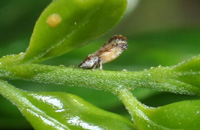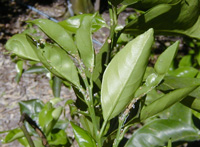The Use of Silwet L-77 to Improve Control of the Asian Citrus Psyllid in Citrus
Project description and objectives:
The research, conducted in the laboratory and field, shows that adding Silwet L-77 to conventional pesticides, even at lower-than-label rates, improves control of eggs, nymphs, and adults of the Asian citrus psyllid. The Asian citrus psyllid is a serious pest of citrus in Florida because it transmits the pathogen that causes greening disease. Improved and lower-cost control of the psyllid is crucial to reducing the rate of spread of this dreaded citrus pathogen.
to conventional pesticides, even at lower-than-label rates, improves control of eggs, nymphs, and adults of the Asian citrus psyllid. The Asian citrus psyllid is a serious pest of citrus in Florida because it transmits the pathogen that causes greening disease. Improved and lower-cost control of the psyllid is crucial to reducing the rate of spread of this dreaded citrus pathogen.
Project activities:
Laboratory trials and two small-scale field trials were conducted to determine how well Silwet L-77 and Kinetic, both organosilicone adjuvants, alone and in combination with abamectin and imidacloprid performed as controls for eggs, nymphs and adults of the Asian citrus psyllid, Diaphorina citri. The laboratory and field data show that Silwet L-77, by itself, was toxic to nymphs at a rate of 0.05% (500 ppm), although it was not very effective on adults or eggs. However, when  Silwet L-77 was combined with reduced rates (one-tenth the lowest label rate or LLR), mortality of eggs and adults was increased in laboratory tests. In a subsequent field trial, the combination of Silwet L-77 and one-tenth the LLR of imidacloprid gave good control of nymphs, but exhibited weak residual toxicity to adults when compared to the label rate of imidacloprid. Additional trials were conducted with Silwet L-77 and Kinetic alone and in combination with imidacloprid or abamectin using potted citrus trees in the greenhouse. Combining Silwet L-77 or Kinetic with one-fourth or one-half the LLR of imidacloprid killed as many eggs, nymphs, or adults as the LLR of imidacloprid. The combination of Silwet L-77 or Kinetic with one-fourth or one-half the LLR of abamectin killed as many eggs and nymphs as the LLR but did not control adults as well. The results obtained need to be confirmed under grove conditions in different climatic zones in Florida.
Silwet L-77 was combined with reduced rates (one-tenth the lowest label rate or LLR), mortality of eggs and adults was increased in laboratory tests. In a subsequent field trial, the combination of Silwet L-77 and one-tenth the LLR of imidacloprid gave good control of nymphs, but exhibited weak residual toxicity to adults when compared to the label rate of imidacloprid. Additional trials were conducted with Silwet L-77 and Kinetic alone and in combination with imidacloprid or abamectin using potted citrus trees in the greenhouse. Combining Silwet L-77 or Kinetic with one-fourth or one-half the LLR of imidacloprid killed as many eggs, nymphs, or adults as the LLR of imidacloprid. The combination of Silwet L-77 or Kinetic with one-fourth or one-half the LLR of abamectin killed as many eggs and nymphs as the LLR but did not control adults as well. The results obtained need to be confirmed under grove conditions in different climatic zones in Florida.
A manuscript with the initial laboratory and field data has been published in Florida Entomologist. The data have also been alluded to in a grant proposal submitted to the Florida Citrus Production Research and Advisory Committee for funding.
Project accomplishments:
The research conducted to date will be continued. We need to validate the work under field conditions in different citrus-producing conditions. If validated, the results could result in reduced pesticide costs, improved control of psyllid eggs, nymphs and adults, and an alternative chemical control that could delay the onset of resistance to other pesticides. If, as our preliminary laboratory data suggest, these products have fewer negative effects on natural enemies, then we will contribute in a positive manner to the IPM program for citrus pest management.
Click here to view the Florida Entomologist article.
Project leader:
Dr. Marjorie Hoy, Professor, Entomology and Nematology, UF